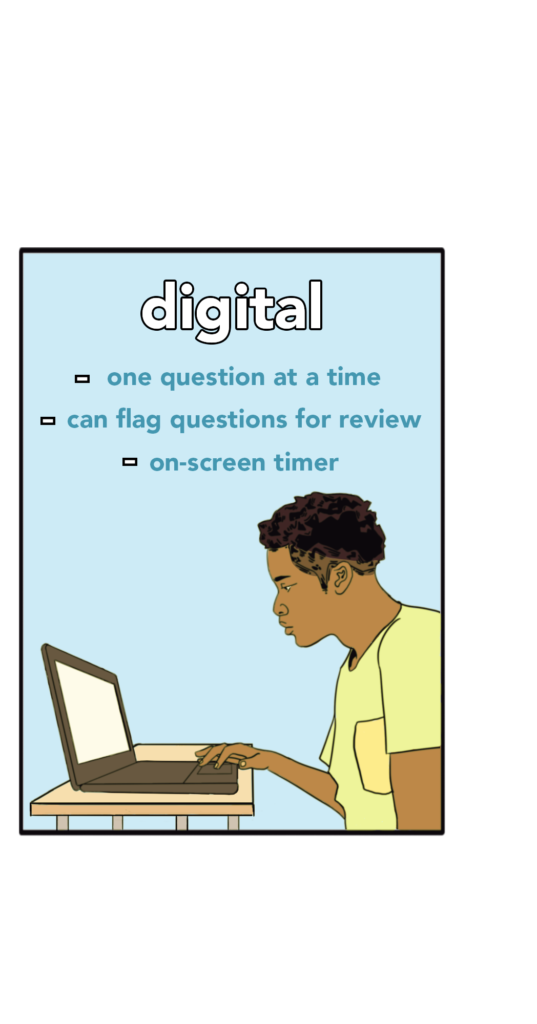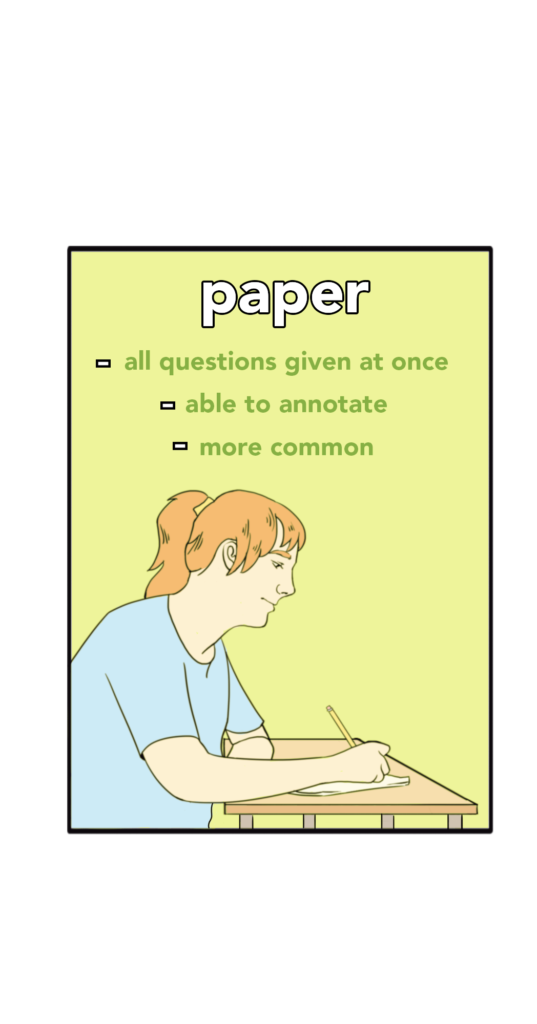Modernizing ACT format leads to difficulties for test-takers
Drew Hoffmaster | The Chronicle
Adjust and adapt becomes the Mason High School (MHS) motto once again.
On Tuesday, February 28, Mason High School (MHS) students took the annual school-administered American College Test (ACT) given across the nation. The ACT is a standardized test taken by high schoolers across the country to test a student’s English, Mathematics, Reading and Science aptitudes. Over the course of 3.5-hours, students are tested in these four subjects and receive a score out of 36 for each section. This score then becomes averaged over the four sections to create a composite score.
This year, however, MHS students took the first online ACT test. ACT has been promising an online test since the pandemic hit in 2020, but this is the first year it has actually been implemented. For junior Becca Sanders, the switch in format has created new testing anxieties such as the applicability of paper test strategies and reading passage annotations.
“Leading up to it, everyone was like, ‘I won’t be able to annotate’ or ‘I won’t be able to do what I normally do,’” Sanders said. “So, it was funny to see how before, everyone was stressed about it, [but after] no one was really talking about how it was online.”
The online test format did offer some additional benefits to make up for the drawbacks. If a question focused on a specific part of the passage in the English and Reading sections, the section was automatically highlighted, saving test-takers the time to find the portion addressed by the question. Additionally, Sanders said that some benefits helped save her time.
“You could flag questions which made a question easier to come back to,” Sanders said. “This feature saved me time because I did not have to look through the whole test.”
Sanders, however, still feels that she would rather take the paper version of the test. She said that the paper version is less strenuous and more similar to her practice. Additionally, she prefers to be able to see the entire test.
“You had to hit next between each question instead of just moving on to the next one like you would on the paper,” Sanders said. “When you have paper, you can see the questions next that you’re going to answer and you can move on a little easier. This makes pacing yourself easier.”
Guidance Counselor Marty Zack has been running the annual MHS ACT for the past 15 years. Zack said MHS switched to a virtual format this year so students would be better prepared if a permanent switch to online testing occurred. Zack believes that fully online testing is a very likely possibility, especially with the money and materials it saves.
“We did [online testing] because it’s the way of the future,” Zack said. “It saves companies millions and millions of dollars. You could change tests whenever you want, [so] it is only a matter of time until [only online testing] hits soon.”
Founder of TorchPrep, an ACT preparation company, Rhett Barbour said that TorchPrep gears their classes toward the online ACT when approaching the school ACTs and toward the paper version during the other times. Barbour believes it is essential for students to know the differences in test format so they can better gauge which version works best for them.
“Students need to know and understand that they should never allow the formatting of the test to get in the way of demonstrating what they know,” Barbour said. “It’s not easy to go back and forth, so the functionality of how to engage the test shifts.”
TorchPrep encourages students to adapt strategies used on the paper ACT to the online version by utilizing tools such as the highlighter, timer, and bookmarker offered on the test. For annotating, the company recommends that students take advantage of scrap paper to take notes.
“To replace annotating, students can use the scrap paper to write notes about the paragraph, so [they] can map the passage out,” Barbour said. “There’s also the ability to highlight quotes to replace underlining.”
Currently, there is no data indicating that either version results in higher scores. Barbour said students should practice both versions to find out which type of ACT fits them best, but they should take advantage of being able to take the paper version while students can.
“[The ACT] is designed by people who are really specifically trying to make [each version] equal,” Barbour said. “So anytime a student says a certain version of the test is difficult, I would say it is not true [because] it’s really a student-by-student situation.”
This February was also Junior Shin-yi Wang’s second time taking the ACT. She completed the paper version of the test in September and said she was surprised by the differences.
“[The difficulty] came from having to get used to it being online which was a little hard,” Wang said. “I couldn’t write out important things. I had to rush and go back later to find what I was looking for.”
Wang said that she did not expect both versions of the test to be so similar. Other than annotating the paper version of the Reading section, her testing strategies did not really differ from the paper version.
“For the other sections of [the paper version], I either did not write anything on the test or just used scrap paper,” Wang said. “For [the other sections], it made no difference between how I approached those problems.
In the end, Wang said she was glad she took the online ACT. She said not filling out a paper scantron gave her extra time and more confidence in her results.
“I’m pretty happy with how it went,” Wang said. “I can’t wait to see what scores I get once they are posted.”


